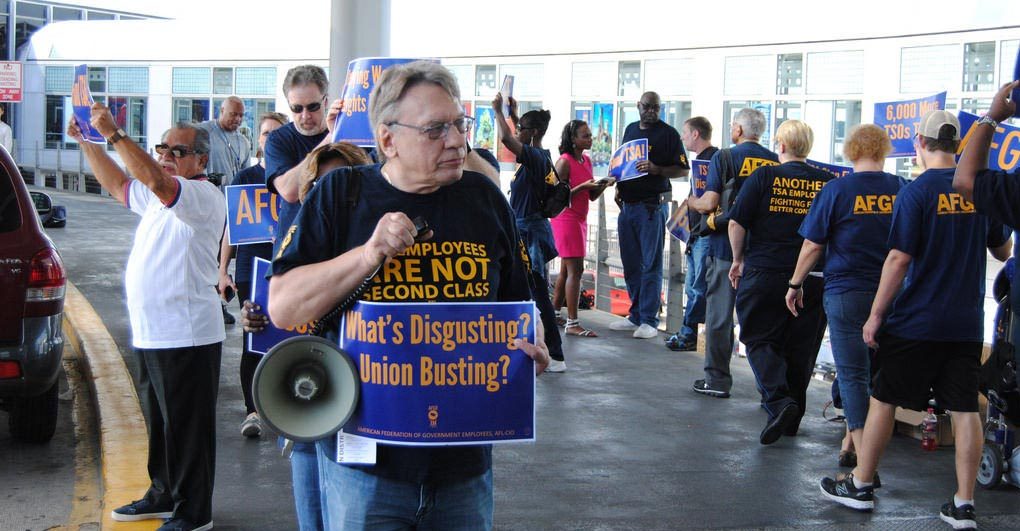Walk a union picket line and you’ll likely join in a common call and response -
“What’s disgusting?”
“Union-busting!”
There’s a reason why it’s a popular refrain - employers in the U.S. spend $340 million per year on “union avoidance” consultants. Union-busting has been a lucrative industry dating back to the infamous Pinkertons. Today’s tactics have changed to include captive audience meetings, one-on-ones, and mass (e)mails but the goal is the same - coerce and intimidate workers out of organizing.

Union-busting and labor law
Legally, management can’t interrogate people about their union support (asking people if they signed union cards or how they plan to vote) or make threats or promises. Employers can share their opinion (which includes encouraging people to vote “no”) and hold “educational” and “informational” meetings.
In reality, most employers stretch the boundaries of “informational” without explicitly or provably breaking the law (that’s where those expensive “union-avoidance” consultants come in). A report from the Economic Policy Institute found employers broke the law in over 40% of union elections in 2016 and 2017. Even in cases with explicit violations, the remedy is filing an unfair labor practice (ULP) with the NLRB and it can take months to receive a decision. I’ve personally heard lies from employers that border on the absurd; a fellow union organizer was once accused of practicing animal sacrifice.
Captive audience meetings
A captive audience meeting is a mandatory workplace meeting in which the employer tries to dissuade employees from unionizing. Though they may be called "educational" or "informational" meetings, the point is to scare people out of organizing. Workers may be subjected to exhausting daily group and individual meetings.
Anti-union propaganda is also targeted towards mid-level management, it's become a standard training practice in numerous corporate workplaces. We recommend watching a few examples so that you know what to expect and can help prepare your colleagues, including one from Amazon, Target, and BFI (a waste management company).
Responding to union-busting talking points
During a union drive in 2020, Hearst employees circulated bingo cards with common anti-union talking points to expect during captive audience meetings. Yes, they really are that predictable!
Whether or not you respond directly to management, you’ll want to be prepared to correct the record like employees did during the ineffective captive audience meetings at Thrillist. We’ve debunked some of the most common myths. What else can you expect to hear and how can you respond?
They will try to drive a wedge between workers and their union:
“The union is a 'third party'," “The union is inherently adversarial”, “The union doesn’t represent you”
The union is made up of workers, including the people in this meeting. We are exercising our right to organize.
If they try to convince you that you don’t need a union and that they are on your side:
“Let’s work this out among ourselves”, “My door is always open”, “We’re listening”, “We already have committees”
We can discuss this at the bargaining table. If there are things that we agree on, let’s put those in a contract.
It’s not uncommon for employers to cry or otherwise emotionally manipulate employees:
“I thought we were a family," "I gave you this job", "We just increased parental leave"
This is not personal. Workers are seeking a voice and representation in the workplace - it's not about individual managers. This is a job and we have families that we need to support.
Trying to elicit guilt, shame, and fear:
“You have it better than other people, you should be grateful just to have this job”
All workers deserve fair and just working conditions. Pitting people against each other results in a continuous race to the bottom.
Misrepresenting the negotiations process and the benefits of unionized workplaces:
“You won’t get merit raises or promotions," "You’ll lose benefits in the contract," "Unions create more bureaucracy"
Once a union is recognized, the employer cannot unilaterally change terms and conditions of employment and has to bargain with the union. We're seeking to get as much as possible for as many people as possible through bargaining. Workers nominate a bargaining committee to develop proposals and we will all vote on the contract before it goes into effect.
Anti-union employers position themselves as experts, hiding the fact that they are being advised by people whose explicit goal is to destroy unions:
“You’re not eligible," "People are unsigning cards," "You have to rescind your cards if you’re ineligible".
The National Labor Relations Board rules on union eligibility - not the employer. Union cards go to union organizers, not employers. Unless it is public, they have no way of knowing who has signed cards.
They may feign concern for workers, conveniently leaving out high executive pay or otherwise company decisions that negatively impact workers:
“You’ll lose money because of dues"
Study after study shows that union workers outearn non-union workers. A 2011 study by the American Sociological Review found “the decline in union density since 1973 explained a third of the increase in wage inequality among men and a fifth of the increased inequality among women.” Workers lose money without unions, not because of dues.
Threats are illegal, though employers are coached in how to frame them vaguely:
“Another factory unionized and it closed right away,” "This is a tough time and we don't want to lay people off".
Negotiations are just that - a negotiation. Workers want fair and sustainable jobs, not to put a company out of business.
Retaliation
Many anti-union campaigns combine incentives and punishments, commonly called “the carrot and the stick”. Incentives (carrots) include promotions, buyouts, or attempting to negotiate with individual workers. The timing is not a coincidence - they are essentially trying to bribe workers. Everything offered is at management’s discretion and can be given or taken away at any time.
Workers might also see more direct retaliation (sticks), like being taken off of a project, assigned a different shift, or even fired. Check out our guide about how to protect yourself and how to proceed if you’ve been unjustly terminated.
Surviving an anti-union campaign
The employer may hold multiple meetings with different groups of people so it’s important to have a central communication channel established to share information and make strategic decisions. You may decide to push back in meetings by correcting inaccurate statements or stating your support for unionizing. It may be best to remain silent and not engage in a back-and-forth with management and debrief later. If management asks if there are any questions, stonewalling them with silence can be a powerful response and demonstrates that people are not willing to engage.
Expect a fight from the beginning. From your very first organizing conversations, it is important to inoculate your colleagues. Inoculation is like a vaccine - give them a taste of the boss medicine so that they know how to respond in the future. Ask them what how they think management will respond and talk them through common myths. Respond to anti-union talking points but try to bring every conversation back to the issues that led people to organize in the first place. Don’t assure people it will be easy, remind them of the issues they want to address through organizing.
No matter what, try not to freak out (deep breathing and/or group text chats can help); don’t try to leave a meeting or do anything that could be considered “insubordinate” or illegal. Workers in states with one-party consent laws can record group and individual meetings (like a voice memo on a smartphone).
Stay strong!
Why do companies spend so much money on anti-union campaigns and consultants? It’s not a rational business decision - paying a lawyer hundreds of dollars by the hour costs far more than fair raises for workers. Highly paid consultants convince employers to hire them simply because they stand to profit.
Union-busting campaigns are stressful but ultimately they reinforce how essential it is that workers stick together to demand representation and protection.



